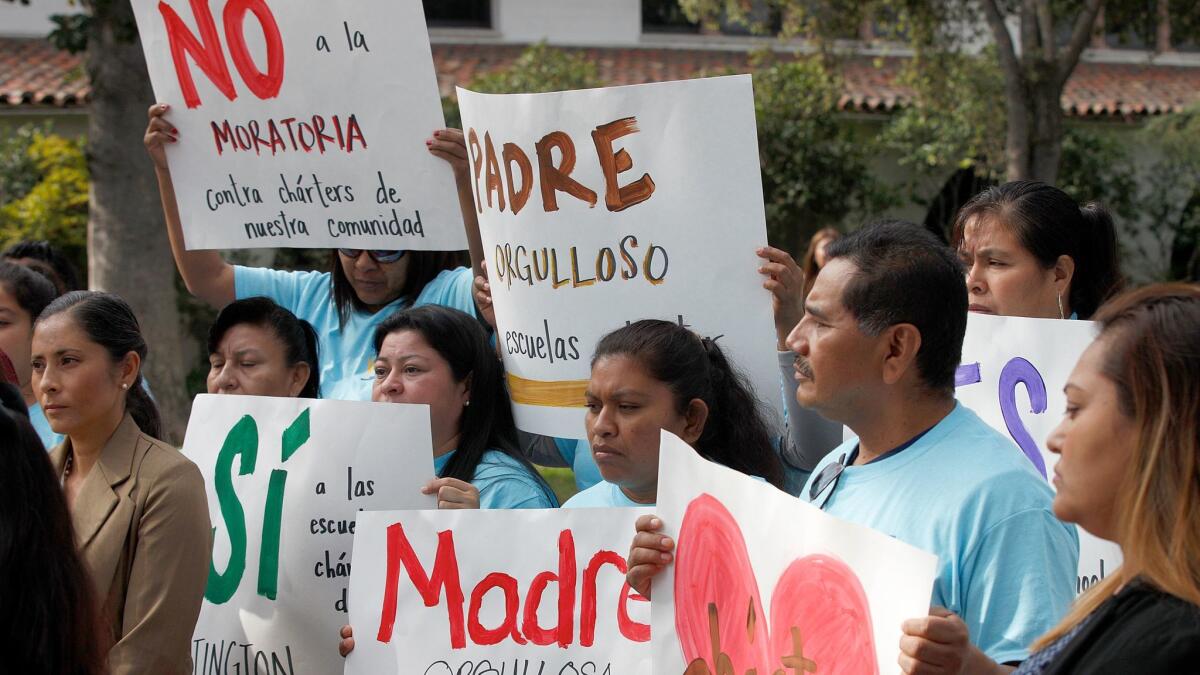Group sues Huntington Park over moratorium on charter schools

- Share via
A group representing charter schools has sued the city of Huntington Park over its decision to impose a yearlong moratorium on new charters.
The suit, which was filed Thursday in Los Angeles County Superior Court, seeks to invalidate the restrictions that the Huntington Park City Council approved last month by a 4-1 vote.
Charters are independently operated and exempt from some rules that govern traditional campuses. Controversy has accompanied their rapid growth, even though they have proved popular with parents. The L.A. Unified School District, which serves Huntington Park, has more charters than any other school system nationwide.
“The city’s politically motivated and discriminatory prohibition of public charter schools, but no other educational institutions, for a full educational year conflicts with California’s policy of expanded educational choices,” states the complaint filed by the California Charter Schools Assn. “The moratorium therefore is void and unenforceable as a matter of law.”
The suit also contends that the city failed to conduct a mandatory environmental review or to provide legally required evidence to justify halting charter growth.
City leaders approved the moratorium during a contentious meeting last month. Charter supporters pointed out local charters’ comparatively high test scores, cited individual success stories and criticized city leaders for standing in the way of a top-flight education for other families.
Charter critics argued that charters undermine traditional schools by attracting students who are easier and less expensive to educate.
The council expressed different concerns. City officials spoke of a “high number of inquiries and requests” for new charters and said the municipal code was “inadequate” for assessing and dealing with their effects.
A city report cited “vehicle circulation, parking and noise” in areas where charter schools had opened, and said they could potentially affect “public health, safety, and welfare.”
The moratorium also applies to existing charter schools that want to move and expand in new locations, according to City Manager Edgar Cisneros.
The charter association requested records of complaints, but the city has provided no documentation to date, said the association’s general counsel, Ricardo Soto.
Association staffers have suggested political motivations. United Teachers Los Angeles, the local (and anti-charter) teachers union, donated $500 to the 2015 campaign of Councilman Jhonny Pineda, and the same union represents Mayor Graciela Ortiz in her day job as a school counselor.
City officials could not be reached for comment Thursday.
Both pro-charter groups and teachers unions are major political donors in California.
An influx of students could be an issue because, unlike most traditional public schools, charters can readily accept students from anywhere, a potential problem in the densely packed southeast L.A. County city.
A Times analysis, however, shows that the number of students in schools with a Huntington Park address has decreased by about 1,800, to about 18,000, since L.A. Unified’s peak enrollment in the 2003-04 school year. Over that same period, the number of schools tripled, from 9 to 27, including six new L.A. Unified campuses and 11 charters.
The impact on school-related traffic has been to disperse it across the city rather than concentrate it in a few places, which could raise objections in some areas, said Benjamin Feinberg, a math teacher at L.A. Unified’s Burbank Middle School in Highland Park. Feinberg, who used to teach at a charter in Huntington Park, analyzes local education-related data on his School Data Nerd blog.
Gary Painter, a professor in the Price School of Public Policy at USC, said it’s unusual for a city to adopt an emergency moratorium “for whatever reasons” against one type of land use, rather than relying on its regular process for managing development. He said he was not surprised by the lawsuit.
Times data analyst Sandra Poindexter and Times staff writer Sonali Kohli contributed to this report.
Twitter: @howardblume
More to Read
Sign up for Essential California
The most important California stories and recommendations in your inbox every morning.
You may occasionally receive promotional content from the Los Angeles Times.














